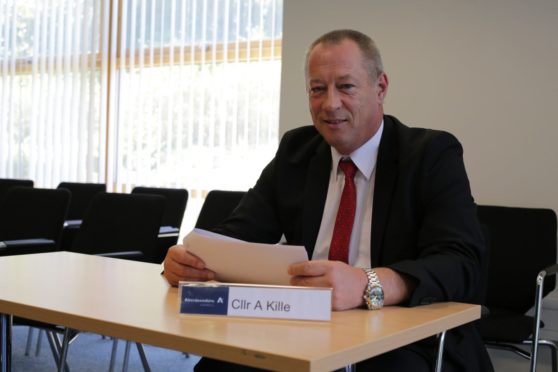Certain decision-making powers have been placed back into the hands of Aberdeenshire councillors after almost 10 months of the local authority operating under emergency measures.
Members have agreed to disband the Recovery Reference Group, a cross-party committee set up in the early days of the pandemic last Spring, with the council’s chief executive Jim Savege soon to look at winding up the officers’ equivalent, the adapted services board.
Yesterday’s full council meeting heard that changes made to the running of the authority had “served their purpose”, although virtual meetings will remain in place until a further review on April 29.
In March, certain powers were passed to unelected officers amid fears that crucial changes could be delayed if too many councillors fell ill and were unable to take part in the usual process.
However, the council has managed to keep committee business going at relatively normal levels over the internet, with the extra powers bestowed upon officers used on just 10 occasions.
Some of those instances were due to the pandemic, and related to business grants, burial charges, taxi licensing, Skype capacity and funding for childcare.
Now new council leader Andy Kille believes they are no longer needed and full power should be restored to elected members and the Recovery Reference Group disbanded.
The Fraserburgh councillor said: “Now are now the best part of a year later with nearly a year’s worth of experience.
“We are at an advantage now in that we know what it looks like and how we can best continue to function effectively. We now know that the Recovery Reference Group was originally meeting once a week but there was not the requirement for that. It then dropped to fortnightly but still the agendas were very light and in many cases included duplicated items from policy committees. The last two meetings consisted purely of presentations.
“As we entered into the unknown it was right to set up the Recovery Reference Group but we do now know that it has not been needed in the way we feared it may and now is the time to close it down.”
However, he added that the virus is once the rise once again meaning “as a responsible council we do still need to prepare for the worst”.
With that in mind, members have agreed that if required in emergency situations the existing Vacation Committee should be renamed the Consolidated Business Committee and expanded to boast decision-making powers.
“As such it will be a better tool for the job than the recovery reference group was, and we certainly don’t need both,” Mr Kille added.
Going forward other changes to the council’s response to the pandemic will include new monthly briefings with NHS Grampian’s executive team.
Mr Savege said: “Members, I think, have been very proud of that fact that all our our policy and area committees have continued to function throughout the pandemic and to provide an effective decision making framework and forum, as with the consolidated business committee to be used as and when needed in that respect as well.
“From a practical view in terms of consultation and engagement we have group readers’ meetings and we have a now newly-proposed monthly briefing with NHS Grampian executive team for all councillors to be able to be briefed, appraised and updated on all matters around Covid-19 or the vaccination programme.”
The move to return certain decision-making powers back to elected members were widely welcomed, however calls were made for thought to be given to how public consultations could improve going forward.
